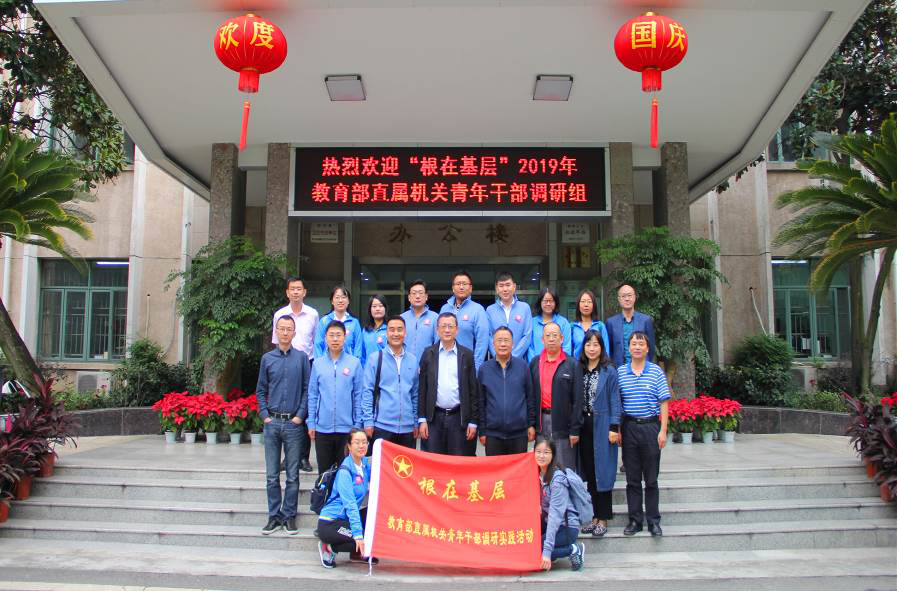 “The Open University of China (OUC) is a university without walls, for its walls are the landscape of the motherland”, said Yin Ximing, secretary of the Party Committee and president of Sichuan Radio and TV University (Sichuan RTVU), to a group of grassroots investigators sent there by the Ministry of Education (MOE).
“The Open University of China (OUC) is a university without walls, for its walls are the landscape of the motherland”, said Yin Ximing, secretary of the Party Committee and president of Sichuan Radio and TV University (Sichuan RTVU), to a group of grassroots investigators sent there by the Ministry of Education (MOE).

Following the requirements of the Party Committee and the Youth League Committee of departments directly under the MOE, the 2019 MOE investigation group, led by the OUC, visited Sichuan’s Chengdu City, Guangyuan City and Cangxi County from 10 – 13 Oct. to research the use of distance education in poverty alleviation, such as through the OUC “Long March Belt” project. A total of three round-table meetings were held for about 90 participants, along with nine visits to villages, communities and activity centres in Cangxi County, and seven one-on-one interviews. The investigators learned what the Sichuan Branch of the OUC has achieved in implementing poverty alleviation in cooperation with prefectural-level cities and counties, and with the strong support and guidance of OUC headquarters.
Research at the Sichuan Branch
Cultivating local talent by improving education
The Sichuan Branch has been active in relation to the situation of the province, cultivating local talent, and taking root in the vast land of Bashu by training rural leaders and village cadres who understand their areas, love agriculture, and apply their learning to helping their fellow villagers. Vice president Liu Chunlong said at the round-table meeting: "Sichuan is a major agricultural province with 188 low-income counties, 66 low-income counties registered at the state level and 45 that are extremely impoverished. The famous Hu Line (also known as the Heihe-Tengchong Line) is our frontier: northwest of it is higher terrain where the population is sparse and urbanisation low. Most of the young and middle-aged adults there work as migrants in other regions. Many members of the village Party and villager committees are in their 40s or 50s, with little education, and no longer in their prime. But many of them are eager for education, and to live better lives. For this reason, we have sent educators to the Ganzi Tibetan and Liangshan Yi Autonomous Prefectures, northeast of the Hu Line. Through distance education, we are able to help local village cadres, who will remain in their hometowns to apply what they have learned.
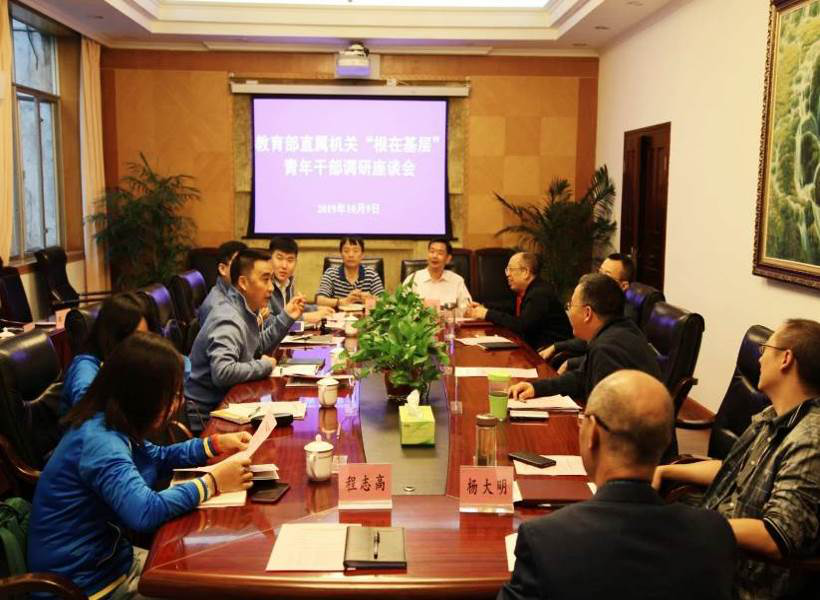
The investigators at a round-table meeting with the Sichuan Branch
Attaining personal and community wealth through education
“Only educated cadres are able to be helpful”, said Zeng Qikui, secretary of the Party Branch Committee of Longyin Village, Wulong Township, Cangxi County, to the investigators. Zeng Qikui is a healthy 52-year-old, and a student in the OUC “Long March Belt” Educational Project Targeted at Alleviating Poverty (hereinafter referred to as the “Long March Belt” project). He manages several ecological parks for raising fish and poultry, to provide jobs in the village, and to promote the green economy. The goal is to become wealthy while sustaining the environment. Whether education is important for enabling people to work in this way is what the investigators wanted to find out. According to Zeng Qikui, it is essential, and one is never too old to learn, or to help and lead others. His two sons have also signed up for the project.
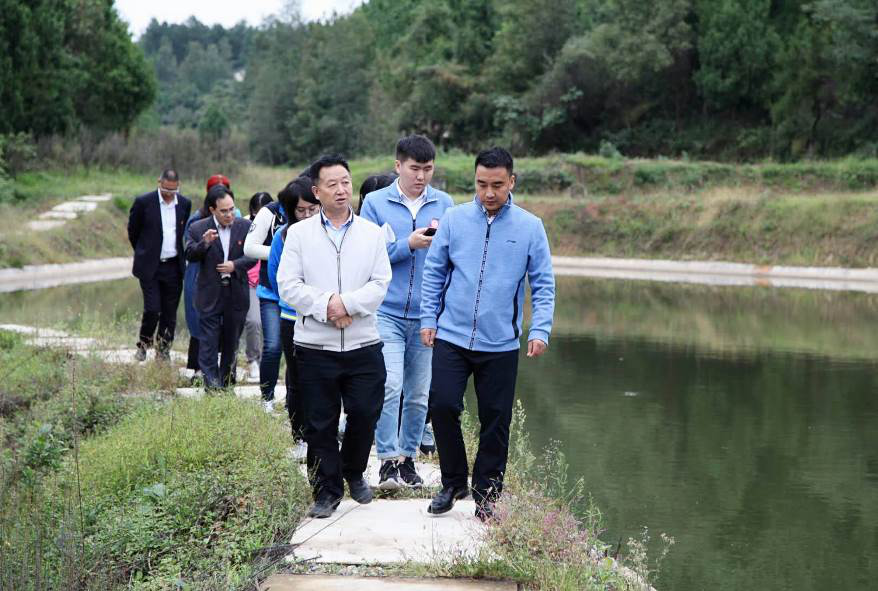
Zeng Qikui showing investigators his fish pond
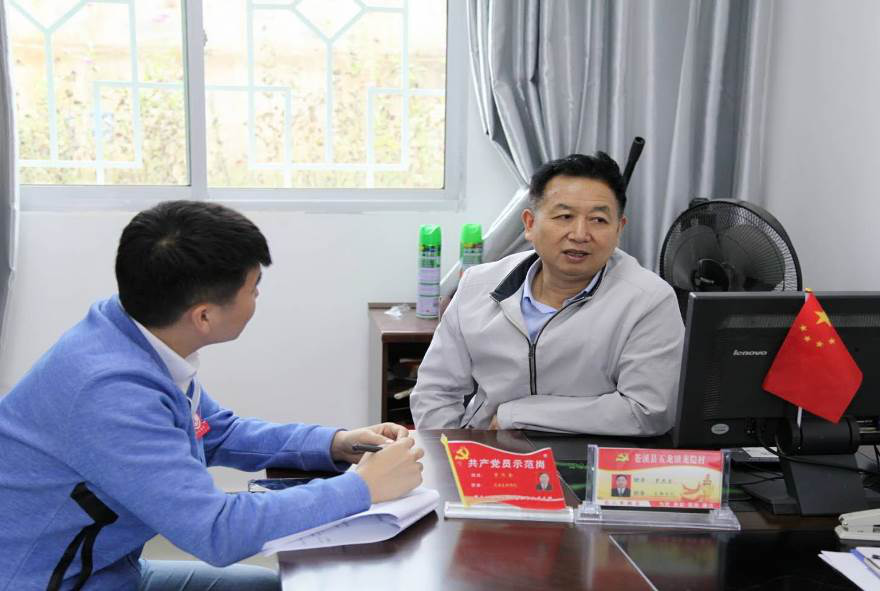
An investigator interviewing Zeng Qikui
After a bumpy ride of about two hours on a winding mountain road, the investigators finally reached Taoyuan Village in Yonghe Township, Cangxi County, more than 1,000 meters above sea level. There they met Yang Min, affectionately known locally as the “Gastrodia Girl”. Yang Min received both her junior-college and undergraduate education at the OUC. A few years ago, she spent three years outside the village learning how to cultivate gastrodia, a medicinal orchid. After returning to the village, she led the establishment of the rural cooperative and became its first shareholder, intending to make use of village land to plant gastrodia on a large scale. There was resistance to this; the villagers were unwilling to transfer their land, wanting to grow crops in the traditional way. Yang Min, who majored in primary-school education, has an easy charm, and was able to persuade some villagers that their village, elevated more than 1,000 meters, and with a particular kind of soil, was optimal for planting gastrodia. Their success then in turn persuaded others, and the popularity of its product meant that the cooperative did not even have to look for customers. Most of the able-bodied villagers are now members of the cooperative. Vice president Cai Hong of Guangyuan RTVU asked Yang Min whether her education at Cangxi RTVU had been helpful, and she said that it had, by empowering her to pursue her dreams and help the other villagers. They in turn have shown their confidence in her by selecting her to be a village cadre.
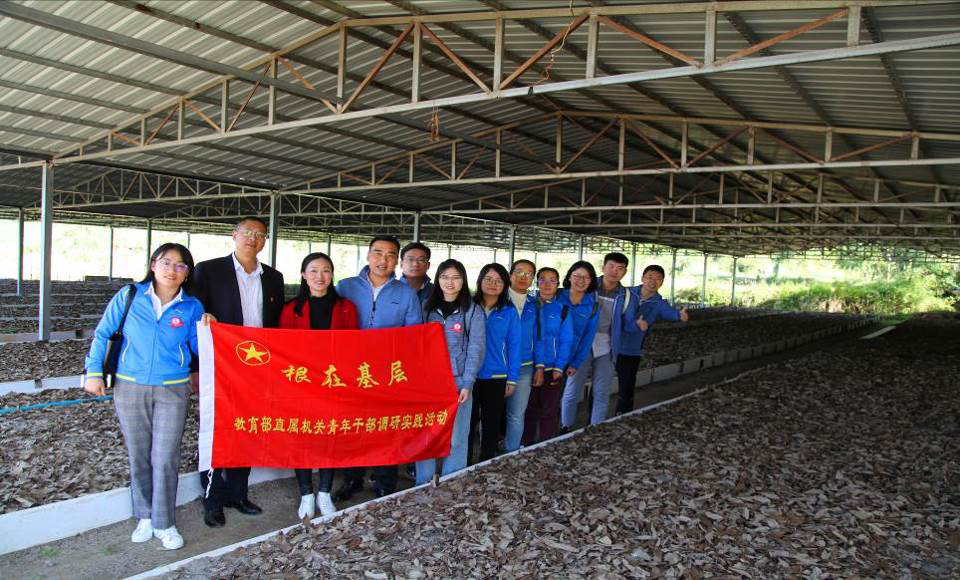
The investigators in the gastrodia plantation with Yang Min, the “Gastrodia Girl”, third from the left
Giving locals practical instruction
In order to enhance implementation of the “Long March Belt” project, Cangxi RTVU has made efforts to integrate resources. Supported by government funding, it has built an e-commerce teaching and activity centre in cooperation with local enterprises, and invited famous teachers and experts, enabling students not only to complete the basic RTVU courses but also to have a place to receive practical training. They not only get rich themselves, but as village cadres help others do so. Feng Hongli, former deputy director of the Sanjiang Villagers’ Committee in Qiping Township, Cangxi County, was a student who benefited from Cangxi RTVU’s e-commerce teaching-and-activity centre. He says, “It was very helpful for me to take part in the ‘Long March Belt' project and learn about e-commerce in 2017. I learned about it not only theoretically, but also practically through the centre. I was taught how to open a store online, give good customer service, settle claims, and so on. Since Cangxi County is the main producer of red-heart kiwi fruit, and most of the farmers there cannot use computers, I helped more than 50 low-income households in the village and surrounding townships with marketing through an e-commerce platform, which was instantly effective. In the past, kiwi fruit sold only via mobile phone, WeChat, or word of mouth, and sales were poor. Now we sell them on major mainstream e-commerce platforms, and so far this year have sold 50 tons of kiwi fruit with a gross profit of 1.3 million yuan, despite flooding. I earn about 100,000 yuan a year for myself, and have bought a car.” According to Feng Hongli, “Yan Shugui, an RTVU expert in kiwi-fruit cultivation, is very helpful at assisting farmers with the practical aspects of their work.”
“Through the ‘Long March Belt' project, Cangxi RTVU not only gave me practical instruction in e-commerce, but also gave farmers here free training in kiwi-fruit cultivation”, Feng Hongli said.
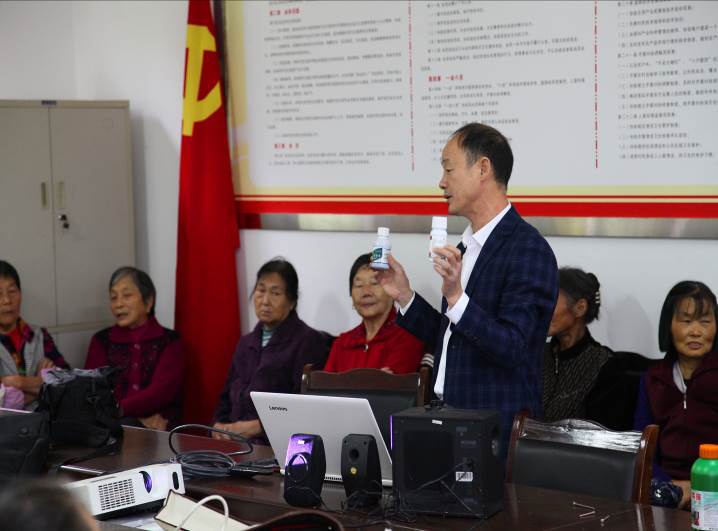
Yan Shugui, an expert in kiwi-fruit cultivation, in Cangxi County
Cooperative actions to alleviate poverty
All the poverty-alleviation projects implemented by the Sichuan Branch have been in cooperation with local Party committees, governments, and other institutions. It aims to expand these projects with their help. A typical practice of Cangxi RTVU has been to report to the Organisation Department of the CPC Committee in relation to its implementation of the “Long March Belt” project. Cangxi County's “One Hundred Local Cadres” educational initiative has been profoundly integrated with the degree education of the “Long March Belt” project; they contribute jointly to the training of local cadres. The tuition expenses of these cadres are covered by the “Long March Belt” project, the Cangxi County Finance Department, the villages of the students, and the students themselves. This cost-sharing among multiple parties has proven to be beneficial. So far more than five admissions have been organized in Cangxi County of 796 cadres, including 230 able village cadres recommended as candidates in the next election for the “two committees” (Party-branch and villager committees) in the village. The village cadres spend little on their schooling, and the opportunity to be recommended for appointment has greatly stimulated their enthusiasm, and led to more of them wishing to study.
A firm system for boosting poverty alleviation
“The RTVUs are a family”, the investigators liked to say.
According to vice president Liu Chunlong, the Sichuan Branch has a fairly standardized and traditional system that is holistic and stable. Through its support, local poverty-alleviation through education has been impressive. In recent years, the branch has been responsible for the planning and coordination of open and distance education in the province. It has assisted implementation of the “Long March Belt” project, with a total of 973 students enrolled, while the “One College Student Per Village” programme has enrolled about 12,000 rural college students, with around 8,000 graduates since its inception, and the “two committees” programme for cadres in Guangyuan, Bazhong, Dazhou and other prefectural-level cities has enrolled more than 3,000 students. Behind these figures are the smiling faces of rural students whose families and communities have been given hope.
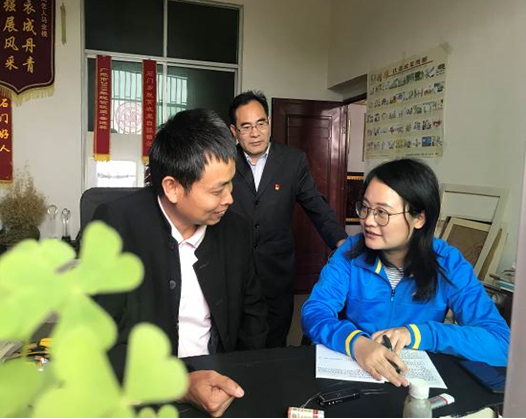
Investigators interviewing Ma Quanmo, a low-income disabled student in the “Long March Belt” project
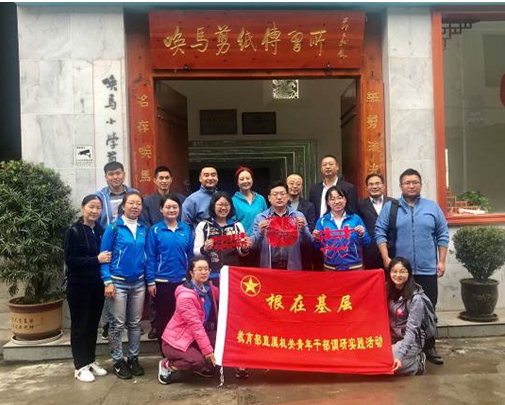
Investigators with non-degree Huanma Paper-Cutting trainees in the “Long March Belt” project

Investigators with vice president Yang Dong of Cangxi RTVU
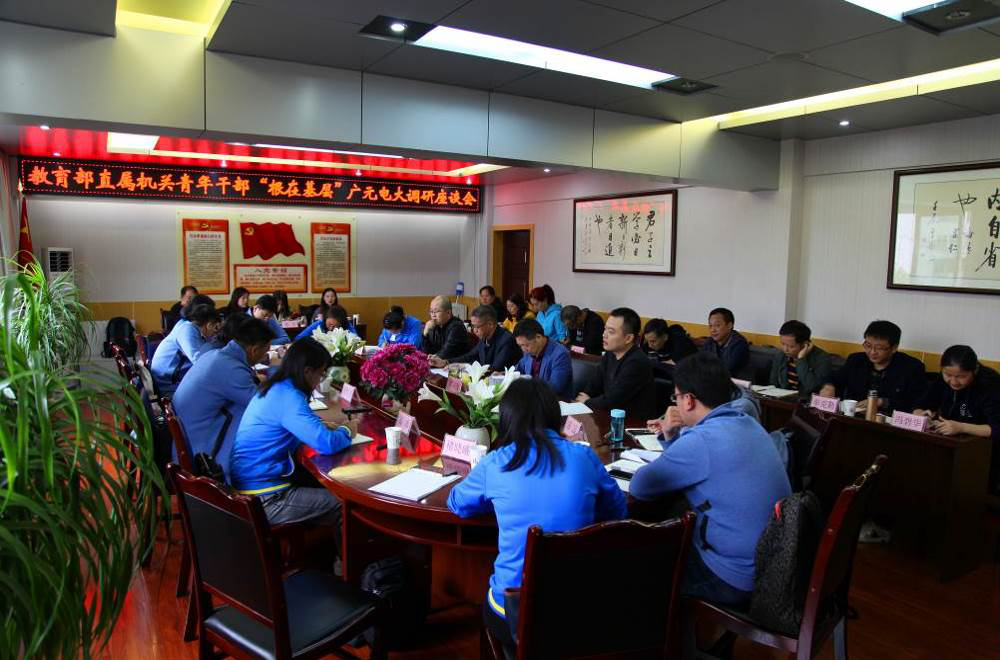
Investigators at a round-table meeting at Guangyuan RTVU
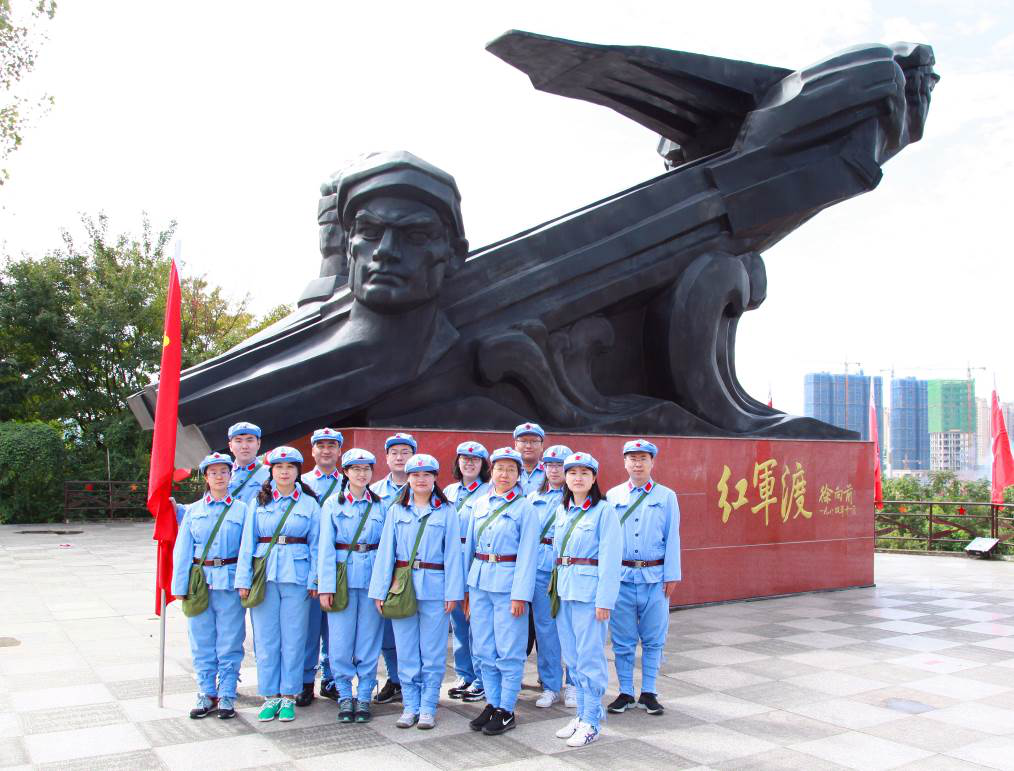
Investigators experiencing “red culture” at the “Ideology and Politics Teaching and Practice Centre” at Cangxi RTVU
Written by Shao Dandan; photos by Chu Xiaoxi, OUC